- Home
- Jean Stone
Four Steps to the Altar Page 6
Four Steps to the Altar Read online
Page 6
“Thanks for dinner, Mr. Kennedy,” Marilla said. “It was way better than my mother’s.”
It might have been a compliment if Andrew didn’t know that the girl’s poor mother was hardly a model for June Cleaver or Carol Brady.
“Well,” he said, “it’s Cassie’s favorite.” He’d made it to make up for their awkwardness last night, and maybe because his daughter might not have been as “cool” about Jo being in his bed as he’d figured she would be.
“Speaking of Cassie,” Cassie said, “she needs a new outfit for May Fair.”
May Fair was a school concert, dance, and all-around festival for sixth, seventh, and eighth graders, or so said the paper that she’d brought home. Jo had said it was tradition at West Hope, though now they had booths for laser tag instead of dunking teachers.
“I’d love to go shopping with you on Saturday,” Jo said, and Andrew silently gave her ten points for putting effort into the bonding thing.
Cassie glanced at Marilla, then looked sullenly at Jo. “No offense, but Marilla and I planned to go to the mall tonight.” She quickly turned to Andrew. “Can you bring us, Dad? It’s after eight, but you won’t mind coming inside, will you?”
The mall had levied a recent rule that kids under sixteen had to be accompanied by an adult after eight o’clock. They’d claimed it was to eliminate bad behavior, though Andrew had often seen adults behaving worse than kids.
“Well,” he said, “I don’t know about tonight, honey…” His eyes turned to Jo, searching for an answer. Maybe they could go together?
But Jo shook her head. Had she taken Cassie’s comment to mean she didn’t want to shop with Jo? “You take them, Andrew,” Jo said good-naturedly. “There are lots of things I can do at home.”
“You’re sure you don’t mind?” Cassie asked, offering thin consolation.
“I think we all should go,” Andrew said. As eager as he was to keep his daughter happy, she wasn’t always going to get her way.
“No,” Jo said. “I can use the time to think about our wedding, now that the paperwork is finished.” She smiled. It was a shallow smile, however, and left Andrew mildly annoyed. He hoped this kind of undercurrent wouldn’t serve as the foundation of every situation that they’d incur as a family. If so, he’d need to find a way to convince himself that this was girls’ stuff, that he shouldn’t let it bother him.
Cassie stood up and said, “It’s getting late, we’d better go.”
Marilla began to stand as well, then looked back at Jo and abruptly asked, “Are you going to change your name?”
Jo blanched. It occurred to Andrew that he’d never seen her blanch. “What?” she asked.
“Change your name,” Marilla repeated. “You know. Are you going to be Jo Kennedy instead of Jo Lyons?”
Andrew didn’t even know that Marilla knew Jo’s last name; then again, everyone knew everyone in West Hope. But what surprised him more than the question was the time it took for Jo to form an answer, and that when she did, she laughed before she spoke.
“Well,” she said, “to be honest, I haven’t thought about that yet.” She stood up and began to bring the dishes to the sink, and Andrew sat there, supposing that changing or not changing her name was another of those things that should be no big deal but knowing that it was, that it would be, to him.
11
Blogs,” Andrew said the next morning in the back room of Second Chances as he helped Sarah and Jo unpack two hundred forty miniature yellow vases, which would be filled with three daisies each and given as favors at the wedding on Friday. He tried to sound upbeat and casual. He figured that talking about blogs was safer than asking Jo if she’d given another minute’s thought to changing her name.
“Did Cassie explain how a blog works?” Jo asked.
“She and Marilla did.” He didn’t add that they’d discussed it at the mall, in bits and pieces while Andrew sat outside one dressing room after another waiting for the giggling girls to parade in front of three-way mirrors. He didn’t add that it would have been more fun if Jo had been there too, especially when the girls disappeared into the lingerie store and left him alone on a bench.
“I think we need a blog for Second Chances,” he continued. “A place where brides can read about the latest trends in second weddings. All of you ladies can take turns. Elaine can talk about food. Sarah about decorations and themes. Jo, you can talk logistics. And Lily can talk about anything she wants, because she will anyway.” He chuckled and plunked another half-dozen vases on Sarah’s design table.
“It actually is a good idea,” Sarah said. “Not that any of us can fit one more thing on our calendars. Between my son and my mother and Sutter and this business, I hardly even have time for my jewelry-making anymore.”
“Which is why you could take turns. It would be more manageable plus offer a good cross section of things to think about. Then the audience can share their thoughts and experiences.” He said the word audience as if he were talking about television.
“Well,” Jo said, “I’m not sure. Will it be accessed from our Web site?” The Web site—secondchancesweddings.com—had been Andrew’s idea too, a few months earlier, when he needed to make up for all the chaos he’d created with the column he’d been writing behind their backs for Buzz magazine. The site had only been “up” for a month or so, but the e-mails were pouring in:
I’ve stayed close to my ex’s sister. Should I invite her to my wedding?
Should we send announcements to friends who aren’t invited?
Should I toss my bouquet like brides do at first weddings?
For the most part, Andrew had been answering the e-mails, which seemed rather asinine because what the heck did he know. But he was always the one who had the least to do, despite that he was now more involved than when he’d been only the receptionist, hired by Lily to sit behind the French-provincial desk and smile at potential customers who sashayed through the door.
Maybe he should include a “Dear Andrew” column. He cleared his throat.
“Of course it will be accessed from our Web site,” he said as he ripped open another carton. “It’s a good idea, Jo. There’s no need to analyze it to death.”
“Well, we should ask Lily and Elaine,” Jo said. “Get their opinions.”
He dove into the carton, pulled out three vases, and slammed them on the table.
Jo looked at him oddly. “It’s just that if we give away too much ‘free’ advice, we’ll cheat ourselves out of business.”
“Or we could lock up a position as second-wedding experts,” Andrew replied, his voice now bordering on testy. Maybe he was pissed about last night, after all. Maybe he was pissed about the night before. Maybe he was just plain pissed that he was a goddamn wedding planner instead of doing something manly like being a television journalist or teaching college, both of which he’d sacrificed for making a perfect meat loaf and marrying a woman who might not even take his name as hers. “Besides,” he added, yanking out more vases and plunking them down with gusto, “it might actually be a good idea to get input from real second-wedding brides, instead of making things up as we go along.”
At some point in the past few seconds Jo and Sarah had stopped working. They stood still, staring at him now, Jo with her green eyes, Sarah with her coal-black ones.
“I’ll be in the showroom,” Sarah said, “while you two figure out whatever your problem is.”
“Andrew?” Jo asked once Sarah had left. “What’s the matter?”
He lined up the vases like little soldiers ready to do battle. “I went to your house,” he said. “But you weren’t home.”
“Last night?” she asked. “I went home right after dinner while you went to the mall…”
Andrew shook his head. He had started on this path to self-destruction now; he might as well continue.
“The night before,” he said. “I talked to Cassie about seeing you in bed. I wanted to tell you that she said she was cool with everything but that
I have a funny feeling she’s not.”
“We both have that funny feeling, Andrew. It was pretty obvious last night.”
He nodded. He did not want to be distracted from the things he needed to say. “So I went to your house,” he said.
“And I wasn’t there.”
“Right,” he said and aligned another row.
“Is that why you’re upset? Why didn’t you say something yesterday?”
“I thought I should forget it. But then these other things happened…”
“Wait,” she said. “You’re upset because I went to see my mother?”
Her mother? She’d gone to see her mother? Andrew knew now that he had become completely certifiable. Jealous and insane. “I didn’t know where you were,” he said. There was no need to mention he thought she had gone off with another man. There was no need to remind her about Patty, to remind her that he’d had a first wife in another time and place.
She went to him and put her arms around him. “Well, aren’t you being just a little ridiculous?”
He supposed he should feel better, but for some reason, he did not. “Are you going to change your name?” he asked, the way Marilla had.
Jo stepped back with a laugh. “Good grief,” she said. “Is that what’s really bothering you?”
“I don’t know,” he said honestly. “But are you?”
He sensed her back arching, a cat staging her defense. “Andrew, I don’t know. I haven’t really thought about it.”
“When did you plan to think about it?”
“I don’t know. Soon.”
He nodded. “Well, let me know, okay?” He tried to smile as he opened another carton, but something in his heart had shifted, and he didn’t like the way it felt.
Andrew’s parents had been very nice people who might have been happier if they didn’t have a child. They’d both been physicians who devoted their careers to caring for strangers and struggled to make time for Andrew in between. Luckily, as he’d gotten older he had John Benson as a mentor, their penthouse-across-the-hall neighbor who’d taken young Andrew under his media-frenzied wing and introduced him to the world of TV and newscasts and expounded on Andrew’s innate presence on and off the camera. People would listen to Andrew, John said. With gifted intelligence hovering beneath his handsome, homespun good looks, Andrew had the rare gift that he could be believed. And it was believability, according to John, where true power lay. All he needed was the courage to use it.
All of which had been a hundred or more years ago, or so it seemed as Andrew kissed Jo on the cheek and said he needed to go outside and get some fresh air and exercise. “All those daisies,” he said with a laugh, but stopped smiling once he was on Main Street.
Something, he knew, was terribly wrong, from the way Cassie was behaving to the doubts that he was having—even to the way he had just snapped over something as stupid as a blog.
Something was wrong. Did that “something” have to do with him or did it have to do with Jo?
No matter what she thought or did, the blog was a great idea. He had planned everything.
I learned about an awesome recipe for mushroom hors d’oeuvres, Elaine might write. Or she could talk about a recipe that used lots of almonds, which seemed pretty hot right now, or maybe a vegan something-or-other that everyone would like. Then others would write back with ideas of their own and communication lines would flow.
He knew it would work. Maybe he could get Lily to write outrageous entries about style or etiquette or something equally chic. Or she could tell him about such stuff and he could write it as if it were coming from her. It wouldn’t be the first time he wrote “undercover.”
Yes, he thought. The blogs would be fun. Surely Jo would see that.
He shoved his hands into the pockets of his denim jacket and walked past the luncheonette. He thought about the time Jo had been there on a date, when he’d gone inside and practically pulled her away from the guy because Andrew was in love with her but couldn’t tell her then.
He loved her so much. Didn’t he?
She was so strong, so smart, so independent. Those were attributes he loved about her, weren’t they? Or was he just an old-fashioned chauvinist at heart?
He glanced in the window of the bookstore that seemed to have been there forever; he spotted the latest novels jockeying for visibility among the stacks of newspapers and high-gloss magazines. He thought about a woman who had called a few months ago and asked if the staff of Second Chances would write a feature column for a new magazine geared to the second-, third-, fourth-time bride. He wondered if the magazine had ever gotten under way. Would that be something he could do? If he had more productive things to do, more of a chance to use his brain, would he feel better about himself, about his life, about the woman he loved?
He passed the real-estate office that featured properties at inflated prices in hopes of snaring tourists/buyers from New York. He thought about the renovations to Jo’s house. The foundation had been poured. There was no turning back now, was there?
Renovations. Blogs. A magazine. Would those things be enough? Would any or all of it help compensate for the fact that he really was a journalist? A man who might have been content to get his job back at the college but it didn’t look as if they were going to agree?
And, if they didn’t, what was he supposed to do?
Turning up his collar to the cool spring breeze, Andrew realized that was his problem. Not Jo, not his ex-wife or his daughter, not the blog. The problem was that Andrew David Kennedy had much more to offer than working with a bunch of women, great though they were, planning weddings, of all things.
He was bored, plain and simple, and he realized now that the future—even with Jo—might not be enough to satisfy his soul.
He raised his head and kept walking, not knowing what the hell he should do now, or who the hell he could talk to, or why the hell he just couldn’t be grateful for all he had and forget that his life had been so much more so long ago.
12
Lily sat in Sutter’s office overlooking the town common and saw Andrew walking up Main Street with his hands stuffed in his pockets and his head held high and rigid. She wondered where he was going and why he was not walking with his usual happy, sneaker-footed gait.
It occurred to her—not for the first time—that, like Lily, Andrew didn’t really belong in the quaint little town. She’d often noticed how hard he worked at trying to fit in, from feigning interest in his daughter’s riding lessons to pretending to like boating to growing scraggly vegetables in his backyard and telling himself they were 4-H award winners. But every so often, like today, Lily noticed that his stride reverted to the fast pace of a Manhattan-born-and-raised boy with his shoulders squared a little too stiffly for West Hope. This time seemed the worst.
She turned back to Sutter, who sat behind an old wooden desk, one Frank had resurrected—along with a number of wooden filing cabinets—from his antiques storeroom. The desk seemed small for a man of such broad shoulders and muscled girth, but the morning light that drifted through the dusty windows softened Sutter’s chiseled copper face and made it seem as if he’d been sitting there forever doing the whole town’s legal business, rather than solely reading Lily’s papers.
Even Sutter’s handsome, costly clothes and sophisticated demeanor did not seem out of place.
No, she thought, Andrew was the only one who seemed so much like Lily—city fish forcing themselves to adapt to the small pond of the country. Perhaps Andrew would fit better once he and Jo were married. Perhaps Lily would too, if she married Frank, if Sutter could find a tiny loophole in the prenup or in Reginald’s will, which he was perusing now.
The big Cherokee man grunted “hmmm” and turned a page.
Lily repositioned herself in her chair, glad she’d worn her beige, ready-to-wear Chanel suit (two years old now, but West Hope wouldn’t notice), grateful she’d learned at an early age that what one lacked in assets one could make up for with an
appropriate appearance. And an appropriate appearance could help one project a well-defined aura of confidence, an essential element when discussing money, or a lack thereof.
She’d had the brilliant idea after running into Sutter the night before. He was an attorney! He knew the law! He was the best kind of friend—a new one—who didn’t yet know all her flaws!
Unless, of course, Sarah had told him.
But Sarah wouldn’t do that, would she? No, she was too private, the way those creative types tended to be. Besides, she was too wrapped up in her family and her new love now. She hardly even mentioned her jewelry-making anymore. Which really was too bad, because if Lily was asked to reveal the most positive thing about her friend, she would say that Sarah Duncan designed silver jewelry as well as, if not better than, Paloma Picasso or Elsa Peretti. Of course, if Lily told Sarah that, Sarah would just laugh at her. The woman, after all, still wore her shining black hair straight down her long back and lived like a leftover hippie in a log cabin that was decorated like a teepee. It was doubtful she’d be pleased to be told she had an elitist sense of style.
Still, thanks to Sarah and Sarah’s new live-in attorney-lover, Lily had gleefully stayed up long past midnight digging through her piles of legal papers, searching for anything that Sutter might be able to use in Lily’s favor.
If only Reginald hadn’t trusted Antonia. If only he’d had a clue that his sister was as beastly as Lily had tried telling him on more than one occasion, that Antonia was jealous because Lily had stolen his time and attention—and probably his love as well—from his precious spinster of a sister, who preferred a life of make-believe at the ballet and the opera to dealing with real people in real time.
“My brother left me in charge, as it should be,” Antonia had announced after the reading of Reginald’s will at the Beckwith attorney’s office, which was enveloped in mahogany and leather and smelled like stale pipe smoke. “I’ll decide what will be a sufficient allowance for you.”

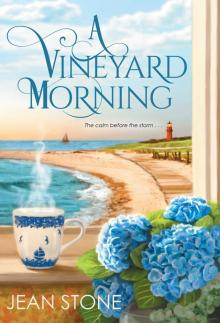 A Vineyard Morning
A Vineyard Morning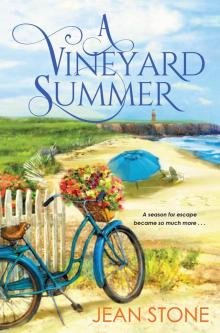 A Vineyard Summer
A Vineyard Summer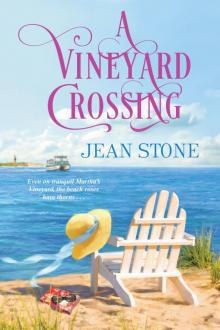 A Vineyard Crossing
A Vineyard Crossing A Vineyard Christmas
A Vineyard Christmas Beach Roses
Beach Roses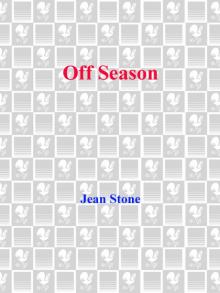 Off Season
Off Season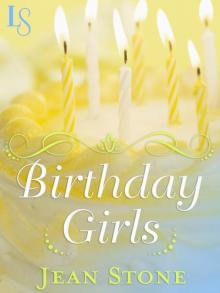 Birthday Girls
Birthday Girls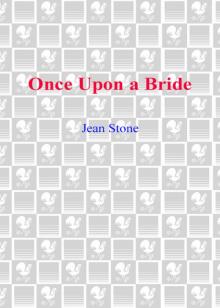 Once Upon a Bride
Once Upon a Bride Places by the Sea
Places by the Sea Trust Fund Babies
Trust Fund Babies The Summer House
The Summer House Tides of the Heart
Tides of the Heart Sins of Innocence
Sins of Innocence Four Steps to the Altar
Four Steps to the Altar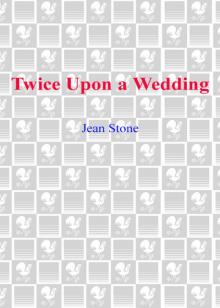 Twice Upon a Wedding
Twice Upon a Wedding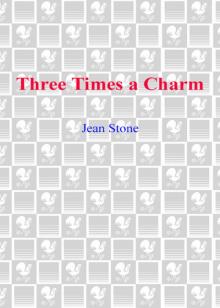 Three Times a Charm
Three Times a Charm